Democrats have called for Donald Trump to be impeached over claims
he asked former FBI director James Comey to drop an investigation into ex-national security adviser Michael Flynn's ties with Russia.
The allegations surfaced just hours after the President said he
shared sensitive, possibly classified, national security information about Islamic State with Russian officials.
As Mr Trump's opponents argue the alleged transgressions are grounds for impeachment, Sky News takes a look at the prospect of charges being brought against the President.
How does impeachment work?
The impeachment process is a constitutional method for removing the President or other federal officials from office.
Under Article II of the US Constitution, officials are removed from office "on impeachment for, and conviction of, treason, bribery, or other high crimes and misdemeanours".
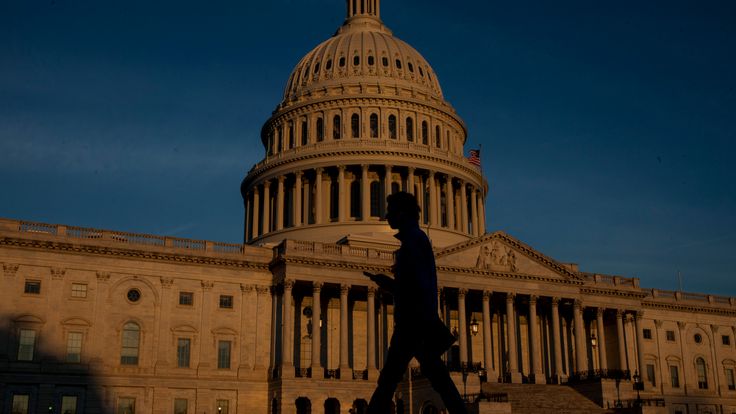
Image:Capitol Building houses the US Senate and House of Representatives
Impeachment begins with an independent investigation by a government body, which provides evidence to the House of Representatives Judiciary Committee.
The committee reviews the report and draws up articles of impeachment.
If a majority in the House votes in favour of impeachment after a debate, the case is passed over to the Senate.
It then holds a trial, in which the Chief Justice of the Supreme Court serves as the judge and the Senate acts as the jury.
If a two-thirds majority votes in favour, the President can be removed from office.
The impeachment of US presidents
Three presidents have been the subject of impeachment proceedings by Congress.
In the cases of Andrew Johnson and Bill Clinton, there were insufficient Senate votes for guilty verdicts and they were acquitted.
There was also an impeachment process against Richard Nixon but instead he chose to resign from office at the height of the Watergate scandal in 1974, before a vote could take place.
:: Andrew Johnson - 1868
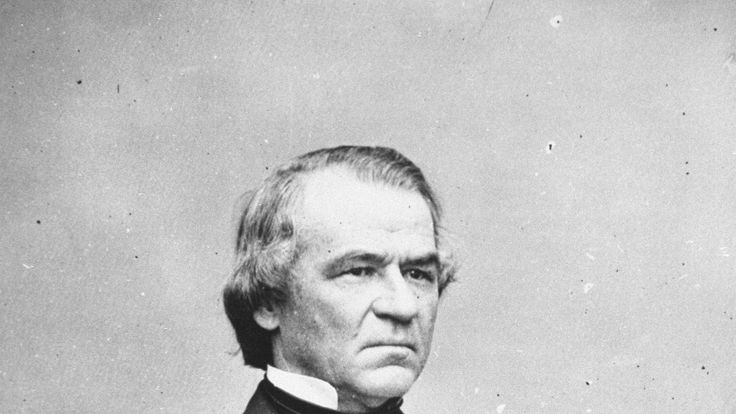
Just 42 days after becoming Vice President, Andrew Johnson was thrust into the Oval Office after the assassination of Abraham Lincoln.
In what characterised his time in office, he repeatedly clashed with the Republican-controlled Congress over the aftermath of the Civil War.
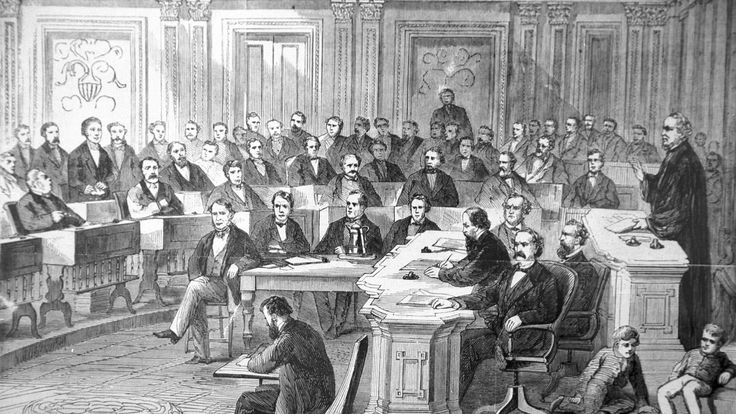
Image:An engraving showing President Johnson's trial on 13 March, 1868
Mr Johnson opposed political rights for former slaves and called for a lenient reconstruction policy, including pardoning former Confederate leaders.
After two unsuccessful attempts to impeach Mr Johnson, he sparked fury by sacking the secretary of war, Edwin M Stanton.
Three days later, the House voted 126 to 47 in favour of impeaching Mr Johnson for high crimes and misdemeanours.
At the conclusion of the hearing the Senate voted 35 to 19 to remove Mr Johnson from office - one vote short of the required two-thirds majority.
:: Bill Clinton - 1998/99
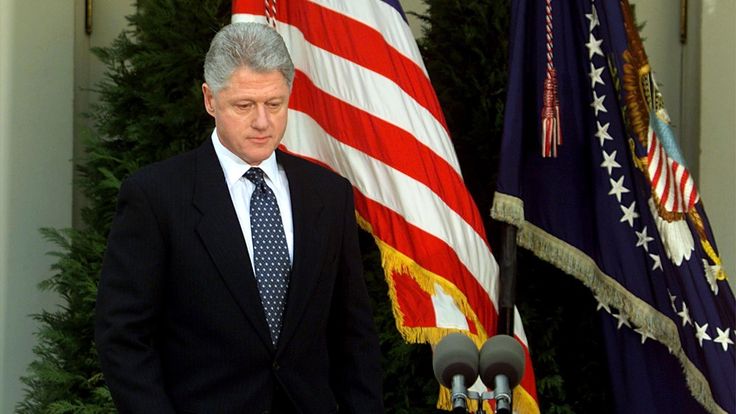
While Andrew Johnson's impeachment was the result of political fractures, Bill Clinton's trial stemmed from personal matters.
In January 1998, he was levelled with claims he had a sexual relationship with 22-year-old White House intern Monica Lewinsky.
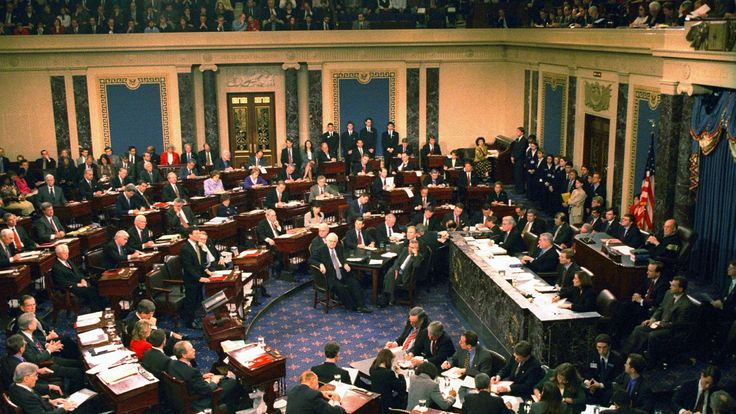
Image:The US Senate votes in its trial against Mr Clinton on 12 February 1999
In a televised speech he forcefully rejected the allegations, saying: "I did not have sexual relations with that woman."
Just six months later he made a u-turn, admitting he had a relationship with Ms Lewinsky "that was not appropriate".
Throughout that time Mr Clinton was being investigated by independent prosecutor Kenneth Starr, whose findings formed the basis of four charges considered by the House.
Two charges - one of perjury and another of obstruction of justice - were approved and the case went to trial.
Votes on both charges fell short of the required two-thirds and Mr Clinton remained in office for another three years.
How likely is impeachment for President Trump?
The US constitution sets a high bar for impeachment - opponents would need to make a convincing case that Mr Trump committed treason, bribery, or other high crimes.
Before claims over the President and Mr Comey emerged, Democratic House of Representatives leader Nancy Pelosi said there was not enough evidence for impeachment.
She said: "What are the facts that you would make a case on? What are the rules that he may have violated?"
"If you don't have that case, you're just participating in more hearsay."
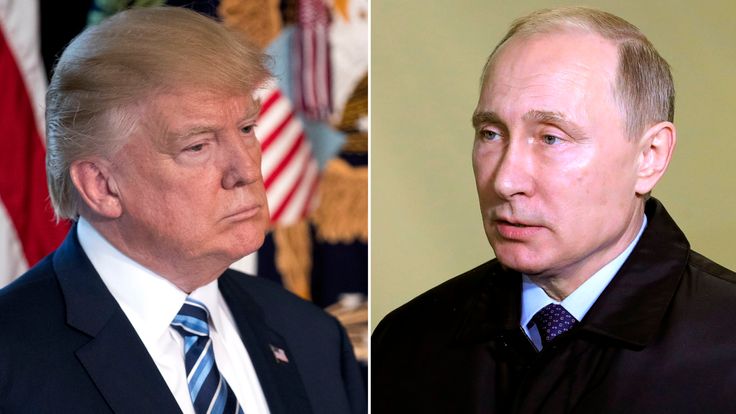
Image:Vladimir Putin says the allegations against the President were 'political schizophrenia'
Jonathan Turley, a law professor at George Washington University, agrees that evidence Mr Trump attempted to interfere with a federal investigation is not concrete.
He said: "What we have is a memo of a President asking highly inappropriate questions of an FBI director.
"This would be pretty thin soup for even an impeachment proceeding."
Despite this, some in Mr Trump's own party appear to be turning on him.
Former presidential nominee John McCain said the controversies surrounding the White House are "reaching the point where it's of Watergate size and scale".
If his opponents attempt to push for impeachment, the numbers are in Mr Trump's favour.
Following articles of impeachment being drawn up, 218 of 435 representatives would have to vote against Mr Trump to approve a trial.
Currently, the Democrats have 193 seats and would require a sizeable number of Republicans to cross the floor.
Furthermore, 67 of 100 senators would need to vote in favour of removing Mr Trump from office - the Republicans currently hold the Senate majority with 52 seats.


 Image:Capitol Building houses the US Senate and House of Representatives
Image:Capitol Building houses the US Senate and House of Representatives
 Image:An engraving showing President Johnson's trial on 13 March, 1868
Image:An engraving showing President Johnson's trial on 13 March, 1868
 Image:The US Senate votes in its trial against Mr Clinton on 12 February 1999
Image:The US Senate votes in its trial against Mr Clinton on 12 February 1999 Image:Vladimir Putin says the allegations against the President were 'political schizophrenia'
Image:Vladimir Putin says the allegations against the President were 'political schizophrenia'